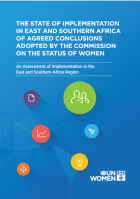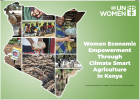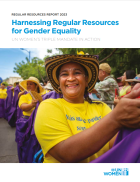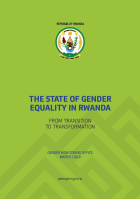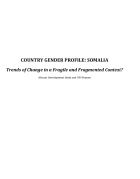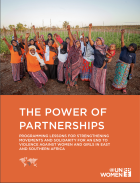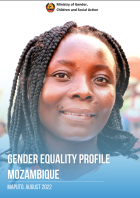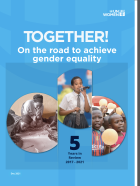1 - 20 of 30 Results
Pagination
Date:
This strategy, developed through stakeholder consultations in Karamoja, seeks to enhance community participation in humanitarian and development efforts. It addresses gaps in accountability and local capacity, proposing a collective, government-aligned approach over individual referral systems. Oxfam, UN Women, CDFU, and District Local Governments commit to implementing a collective Accountability to Affected Populations (AAP) mechanism. The strategy outlines four objectives (2025–2030): build community capacity, improve complaint systems, mainstream community perspectives, and strengthen engagement. It includes monitoring, risk mitigation, and sustainability plans. This calls for collaboration among UN agencies, NGOs, communities, and government for inclusive, impactful, and sustainable programming.
Date:
The baseline survey assesses gender equality in Zimbabwe’s private sector, revealing low female representation in leadership, underrepresented professions, procurement, and share ownership. Only 20 per cent of CEOs and 25 per cent of directors are women. Few companies enforce gender policies or support women through procurement or CSR. The study recommends integrating gender equality into business strategies, improving enforcement, and supporting women-led enterprises through targeted programs, advocacy, and investment literacy.
Date:
The Commission on the Status of Women (CSW) monitors gender equality commitments and the Beijing Declaration. A study by UN Women East and Southern Africa assessed CSW63–CSW66, finding strong treaty ratification but weak policy implementation. Challenges include inadequate funding, weak national preparations, and limited African influence in CSW negotiations. Recommendations include strengthening coordination, enhancing stakeholder engagement, and improving CSO participation to boost Africa’s impact in global gender equality discussions.
Date:
The UN Women Kenya Annual Report highlights key achievements in advancing women’s empowerment and gender equality.
This report showcases progress in increasing women’s leadership and political participation, strengthening economic empowerment, eliminating violence against women and girls, engaging women in peace and security efforts, and enhancing planning and coordination.
UN Women Kenya remains dedicated to building a future where women are at the heart of developing resilient and sustainable communities.
Date:
The WEE-CSA Storybook showcases the success stories of over 2,400 women from Kitui, Laikipia, and West Pokot who have transformed their lives through climate-smart agriculture. Funded by KOICA and implemented by UN Women Kenya, it highlights the project's impact on livelihoods and gender equality while sharing valuable lessons learned. This collection celebrates resilience and aims to inspire further community upliftment for sustainable development in Kenya.
Date:
The report demonstrates how regular resources are invested to advance integrated triple mandate results. This includes explicit recognition of the expertise and leadership of UN Women staff, which relies on regular resources investments. Country, regional, and global examples illustrate how regular resources, often together with other resources, build momentum in synergy to deliver important advancements for women and girls.
Date:
This report highlights some encouraging advancements. The information presented in this report is based on the latest available data (as of June 2024) on selected indicators in the global indicator framework for the Sustainable Development Goals.
Date:
Empowering women, building resilience: A UN Women and FAO Kenya project tackles climate challenges in arid regions. The initiative equips them with climate-smart agriculture skills, boosting incomes, nutrition, and their voice in agricultural policies. This collaborative effort fosters a future where women are key players in building sustainable livelihoods that thrive despite climate change.
Date:
This Regional Coordination Strategy articulates how UN Women will leverage its unique triple mandate—encompassing normative support, UN system coordination, and operational activities—to mobilize urgent and sustained action to achieve gender equality and the empowerment of all women and girls and support the achievement of the 2030 Agenda.
Date:
This publication highlights the progress and prevailing gender gaps in Rwanda so far as far as Gender Equality and Women's Empowerment is concerned. It also gives insights into the state of gender equality in the National Strategy for Transformation (NST1) pillars.
Date:
The publication presents a Country Gender Profile for Somalia examining core trends in gender and inclusion, new policies and legalisation, and institutional capacity to promote gender equality, particularly in a fragile and fragmented context, with change and progress assessed since 2012.
Date:
This report presents the findings and recommendations from UN Women’s qualitative research on joint initiatives for ending violence against women and girls (EVAWG) implemented between 2016-2022 in East and Southern Africa (ESA).
Date:
This publication discusses the country's progress with regard to gender equality and the empowerment of women and girls in the different spheres considering the commitments assumed by the Government of Mozambique.
Date:
The Annual Report captures the work of UN Women in Zimbabwe to accelerate Gender Equality and Women's Empowerment in Zimbabwe. It highlights the organisation's initiatives, challenges and milestones achieved in 2021.
Date:
The five years in review publication captures the progress made from 2017 to 2021 across its different focus areas: Leadership and Political Participation, Women’s Economic Empowerment, Ending Violence Against Women, Data and Statistics, HIV/AIDS and the response to the unfolding crisis caused by the COVID-19 pandemic.
Date:
This report highlights UN Women Nigeria’s work for the year 2020. The report builds around the Nigeria Country Office programmatic areas of intervention and reflects the achievements attained in collaboration with various government and non-governmental partners who contributed to policy advocacy efforts, delivery of services, implementation, and funding of interventions aimed at promoting gender equality and women’s empowerment. The population at large (men, women, boys...
Date:
The brief highlights the purpose of exchange visits, the best practices identified participants, and the key messages of the forum for Civil Society.The main aim of the visits was to get exposure to and gain a better understanding of, countries’ experiences on climate-smart agriculture (CSA) and agribusiness practices so as to synergize with national-level lessons for action.
Date:
UN Women Kenya Annual report aims to share the results and lessons learned for 2020.
Date:
The newsletter aims to serve as an information-sharing platform to promote accelerated action for Gender Equality and Empowerment of Women (GEWE) in Africa. The newsletter features good practices, knowledge, and efforts by the AUC, ECA, and UN Women that help ensure Gender Equality and Empowerment of Women in Africa is sustained.
Date:
The working paper and accompanying policy brief provide an analysis of the progress and gaps across the continent in promoting young women’s role in decision-making and political processes across Africa. The paper further proposes recommendations for consideration by AU and AU Member States including for gender-responsive COVID 19 response and recovery plans that guarantee the participation and integration of the voices of young women.



